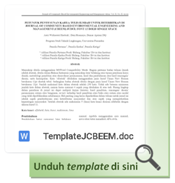PARTICIPATION OF LOCAL RESTAURANTS IN SOLID WASTE MANAGEMENT IN SOUTH COAST OF GUNUNGKIDUL REGENCY, INDONESIA
DOI:
https://doi.org/10.23969/jcbeem.v4i1.1978Keywords:
tourism impact, marine tourism, beach tourism, community participation, restaurant wasteAbstract
Restaurants also contribute to the generation of solid waste in tourism destinations. Participation needs to be identified because restaurants participate in utilizing and getting benefits from the tourism development. This research aims to analyze the participation of restaurants in solid waste management started from the planning stage, implementation stage, benefit stage, and evaluation stage. The research is located on the beach Ngrenehan, Ngobaran Beach, Baron Beach, Sepanjang Beach, Kukup Beach and Drini Beach. The consideration that underlies location selection is the existence of restaurants and tourists. Quantitative data were collected using a questionnaire distributed to 48 restaurant owners. The data that has been collected is then processed using simple statistics to see the frequency and average. Simplified data were then analyzed using a qualitative descriptive approach and strengthened by the results of field observations and interviews. In general it can be concluded that restaurant owners actively participate in solid waste management. Participation in the planning stage was 73%, the implementation stage was 66%, the benefit taking stage was 100%, and the evaluation stage was 81%. Restaurant owners since the early stages of participation have shown positive activity. At the implementation stage, participation is influenced by the lack of knowledge and understanding related to the solid waste they have. Perception in taking benefits is influenced by how cleanliness of restaurants is felt to be beneficial both directly and indirectly. Participation in the evaluation was shown by the majority of respondents feeling that solid waste management was in accordance with planning and expectations.
Downloads
References
Baldwin, C., Wilberforce, N., & Kapur, A. (2011). Restaurant and food service life cycle assessment and development of a sustainability standard. The International Journal of Life Cycle Assessment, 16(1), 40–49. https://doi.org/10.1007/s11367-010-0234-x
Bashir, S., & Goswami, S. (2016). Tourism Induced Challenges in Municipal Solid Waste Management in Hill Towns: Case of Pahalgam. Procedia Environmental Sciences, 35, 77–89. https://doi.org/10.1016/j.proenv.2016.07.048
Bhawal Mukherji, S., Sekiyama, M., Mino, T., & Chaturvedi, B. (2016). Resident Knowledge and Willingness to Engage in Waste Management in Delhi, India. Sustainability, 8(10), 1065. https://doi.org/10.3390/su8101065
Damanhuri, E., & Padmi, T. (2010). Pengelolaan sampah. Diktat kuliah TL, 3104, 5-10.
Dhokhikah, Y., Trihadiningrum, Y., & Sunaryo, S. (2015). Community participation in household solid waste reduction in Surabaya, Indonesia. Resources, Conservation and Recycling, 102, 153–162. https://doi.org/10.1016/j.resconrec.2015.06.013
Dwiyanto, B. M. (2011). MODEL PENINGKATAN PARTISIPASI MASYARAKAT DAN PENGUATAN SINERGI DALAM PENGELOLAAN SAMPAH PERKOTAAN *. Jurnal Ekonomi Pembangunan: Kajian Masalah Ekonomi Dan Pembangunan, 12(2), 239. https://doi.org/10.23917/jep.v12i2.196
Gunungkidul, B. P. S. K. (2018). STATISTIK DAERAH KABUPATEN GUNUNGKIDUL 2018. Badan Pusat Statistik Kabupaten Gunungkidul.
Han, Z., Zeng, D., Li, Q., Cheng, C., Shi, G., & Mou, Z. (2019). Public willingness to pay and participate in domestic waste management in rural areas of China. Resources, Conservation and Recycling, 140(September 2018), 166–174. https://doi.org/10.1016/j.resconrec.2018.09.018
Haswindy, S., & Yuliana, F. (2018). Partisipasi Masyarakat Dalam Pengelolaan Sampah Pemukiman Pada Kecamatan Tungkil Ilir Kabupaten Tanjung Jabung Barat. Jurnal Ilmu Lingkungan, 15(2), 96. https://doi.org/10.14710/jil.15.2.96-111
Kaho, J. R. (2010). Prospek Otonomi Daerah di Negara Republik Indonesia.
Kartikawan, Y. (2007). Pengelolaan Persampahan. Jurnal Lingkungan Hidup. Yogyakarta.
Lakshmi, S. R., & Shaji, T. L. (2016). Transformation of Coastal Settlements Due to Tourism. Procedia Technology, 24, 1668–1680. https://doi.org/10.1016/j.protcy.2016.05.188
Mardikanto, T., & Soebiato, P. (2015). Pemberdayaan Masyarakat dalam Kebijakan Publik. Alfabeta.
Mikkelsen, B. (2011). Metode penelitian partisipatoris dan upaya pemberdayaan : panduan bagi praktis lapangan. Yayasan Pustaka Obor Indonesia.
Posmaningsih, D. A. A. (2016). Faktor-Faktor Yang Mempengaruhi Partisipasi Masyarakat Dalam Pengelolaan Sampah Padat Di Denpasar Timur. Jurnal Skala Husada, 13(1), 59–71.
Puspitawati, Y., & Rahdriawan, M. (2012). Kajian Pengelolaan Sampah Berbasis Masyarakat dengan Konsep 3R (Reduce, Reuse, Recycle) di Kelurahan Larangan Kota Cirebon. JURNAL PEMBANGUNAN WILAYAH & KOTA, 8(4), 349. https://doi.org/10.14710/pwk.v8i4.6490
Soekadijo, R. G. (1996). Anatomi pariwisata: memahami pariwisata sebagai “systemic linkage.” Gramedia Pustaka Utama.
Solehati, M., Chaniago, I. A., & Hutagaol, M. P. (2005). Studi tentang pengelolaan sampah padat rumah tangga di kota Meulaboh, kabupaten Aceh Barat provinsi Nanggroe Aceh Darussalam. IPB (Bogor Agricultural University).
Steva, L. (2017). How Restaurants Benefit The Local Economy. Retrieved November 13, 2019, from https://www.keloland.com/news/how-restaurants-benefit-the-local-economy/
Sulistiyorini, N. R., Darwis, R. S., & Gutama, A. S. (2015). Partisipasi Masyarakat Dalam Pengelolaan Sampah Di. Share Social Work, 5(1), 71–80.
Sumaryadi, I. N. (2005). Perencanaan pembangunan daerah otonom & pemberdayaan masyarakat. Citra Utama.
Tatàno, F., Caramiello, C., Paolini, T., & Tripolone, L. (2017). Generation and collection of restaurant waste: Characterization and evaluation at a case study in Italy. Waste Management, 61, 423–442. https://doi.org/10.1016/j.wasman.2017.01.020
Vaughn, J. (2009). Waste management: a reference handbook (Vol. 46). https://doi.org/10.5860/CHOICE.46-5638
Wahyono, S. (2001). Pengolahan Sampah Organik dan Aspek Sanitasi. PENGOLAHAN SAMPAH ORGANIK DAN ASPEK SANITASI, 2(2), 113–118.
Yuliastuti, Nyoman, Ayu, I., Yasa, Mahaendra, N. I., & Jember, Made, i. (2013). SAMPAH DI KABUPATEN BADUNG sebagaimana mestinya jelas akan berdampak terhadap pencemaran lingkungan. E- Ekonomi Bisnis Universitas Udayana, 02, 374–393.
Zeng, C., Niu, D., Li, H., Zhou, T., & Zhao, Y. (2016). Public perceptions and economic values of source-separated collection of rural solid waste: A pilot study in China. Resources, Conservation and Recycling, 107, 166–173. https://doi.org/10.1016/j.resconrec.2015.12.010














